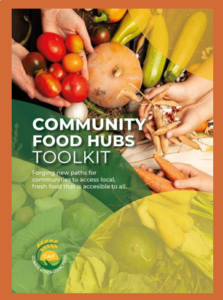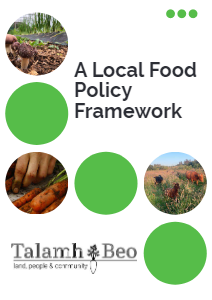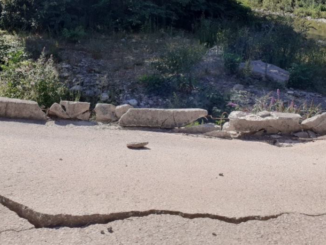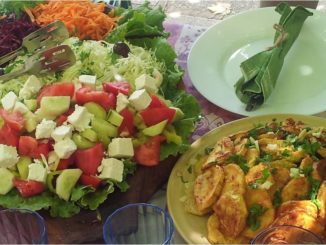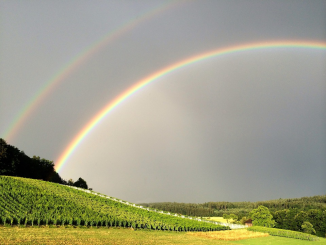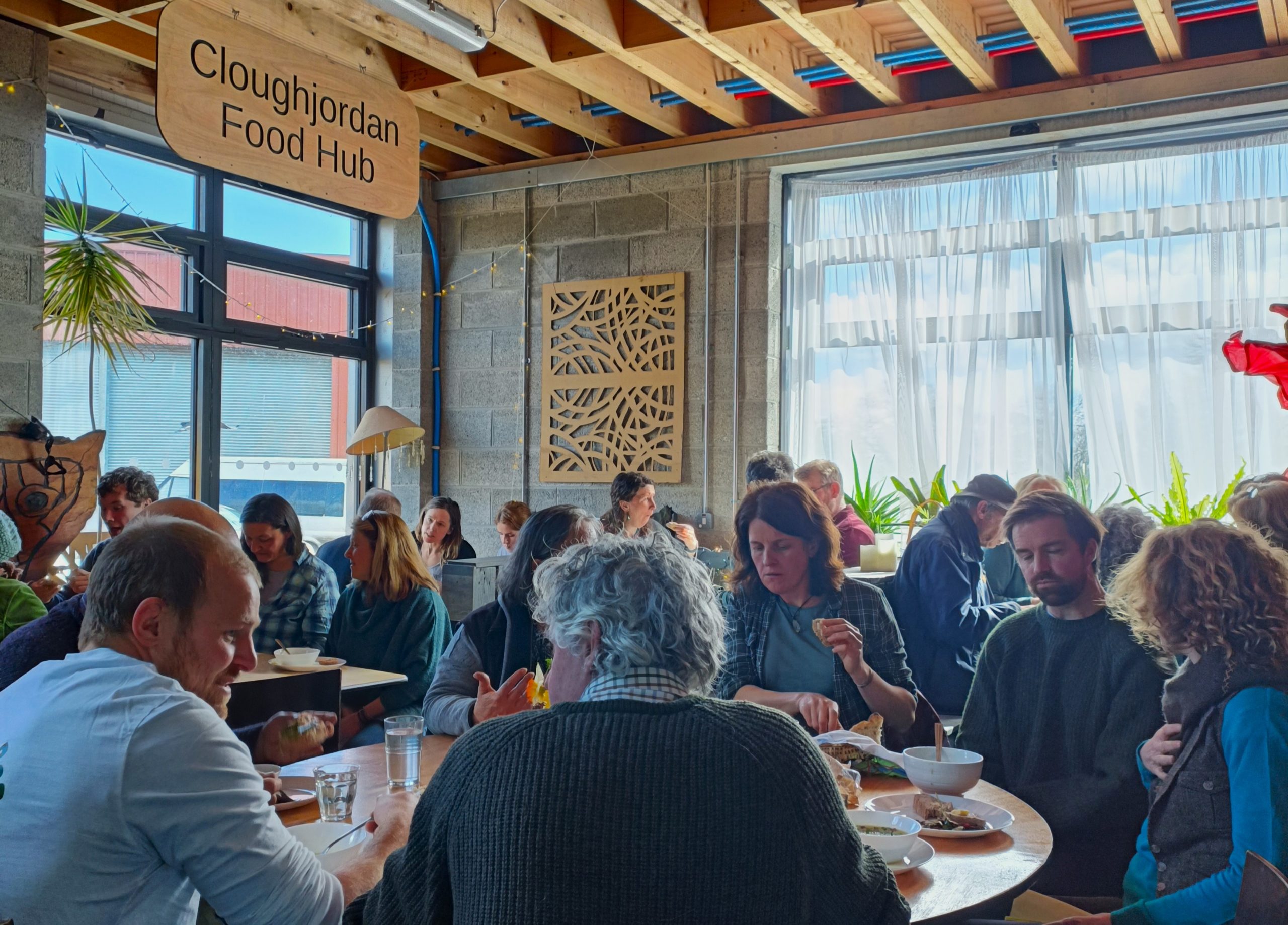
The Feeding Ourselves gathering 2024 saw a diverse range of people and topics over four days in the Irish midlands. From policy analysis to deep listening, tactile workshops to building bridges the four days were a full spectrum of experiences. Here we summarise Friday, a local food economies experience for activists, enablers and organisers in this area. So what’s needed, and what can be done to help embed and amplify agroecological local food provisioning by communities, for communities? Oliver Moore reports.
Friday at Feeding Ourselves 2024 was dedicated to the topic of food hubs, climate action and local food economies. People focused on potential pathways to community resilience through cooperative approaches to short supply chains, hearing from practitioners in the field, both in Ireland and internationally.
The day began aptly enough with an introduction to the Climate Action and Local Food project which has developed resources to help communities to establish their own Community Food Hubs.*
The toolkit contains information on the various models of Food Hub, how to get started and tools to help develop food hubs in your community, as well as inspiring case studies of some hubs already operating across the country. It’s available by contacting lovelocal@openfoodnetwork.ie and shortly on the open food network Ireland site.
This opening session saw reference made to “activating the ordinary” (Noreen Byrne of UCC’s Centre for Co-Operative Studies). In other words – what’s in your place, now? What does it do and what could it do for your community’s needs? Credit Unions were cited as an example, while reference was also made to how this was the initiation of the Gaelic revival period in the build up to independence, when dairy co-ops emerged after the land acts.
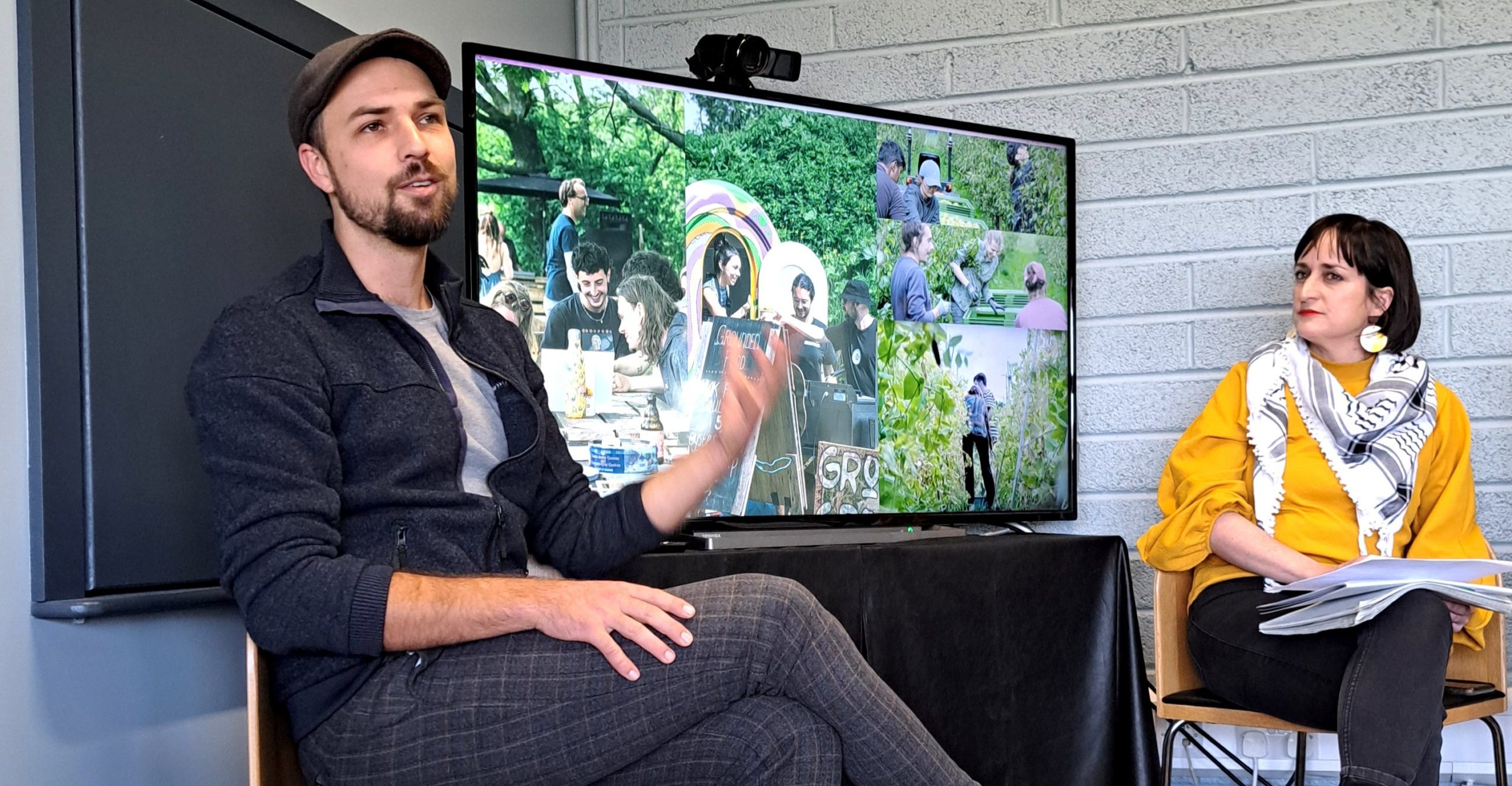
Maarten Klop of a number of initiatives in and around Utrecht (the Netherlands) including Grounded (festivals) and Amped (regenerative ag) (and EU4Advice) cited his involvement with festivals as a great way into sustainable thinking and living for people, via an inspire, activate, co-create loop. The Dutchman also made reference to collaboration as a way to avoid becoming the next big supermarket; to digitally-driven community efficiencies (matching grocery lists of haves and wants) taking inventories of bottom up networks to build upon extra growth (the sunshine of attention and rain of money) and the importance of peer-to-peer learning in agroecological circles.
What are food hubs exactly?
Evonne at Open Food network (OFN) pointed out that food hubs are not simply surplus distribution centres or purely commercial enterprises. Community Food Hubs are centres of expertise and advocacy for the local food system.
Some common characteristics:
- Mission-driven, community-owned and led social enterprises.
- Can help people upskill and train in growing, preserving and/or other food work; micro-enterprise development and other related food business and development activities
- Can include growing spaces, community kitchens, education spaces, markets (digital and physical) and community gathering spaces.
- Embedded in their place and working to make quality, nutritious, locally produced food available to all, at a fair price for producers.
What do Food Hubs need? Barriers and Enablers
The Lessons from the Field panel gathered a number of Food Hub practitioners to outline their needs in terms of supports to make their enterprises more viable – Imelda Mullen (Local Green Box Cavan), John Brennan (Drumshanbo Food Hub), Evonne Boland (Local Market Hub Newbridge) and Janet Power (Talamh Beo).
The inspiring stories gave an insight into the challenges of working with small margins in a labour intensive project, in the community sector which struggles to be valued and to capture support for labour costs.
This is coupled with the challenges of the cost of living increases and a lack of general understanding for the importance of local food and food sovereignty generally. The agencies on the ground do not see the Food Hubs as solutions to a problem and can be slow to provide the appropriate support.
While there is little substantial support from Teagasc, Bord Bia or others directly involved in agri-food, there are at least stirrings from the ground up. What’s more, these rumblings show a pathway to policy-makers.
The Talamh Beo Local Food Policy Framework
The Talamh Beo Local Food Policy Framework maps out a range of ideas, needs and supports to activate and animate the local food resilience, which so often engages with food hubs as a next level for growers and producers, to add value.
The framework includes institutional recognition for Local Food Producers, with set parameters for what constitutes local provisioning; income support to stimulate local food supply via match funding up to 15,000E; a financial categorisation relevant for loans, VAT and insurance; labour activation and retention measures, and finally improved land access rights and regulations.
Importantly, Talamh Beo proposals include “the establishment of Community Food Hubs which have a local Food Facilitator”. Hubs would have representation by local producers at the organisational level, and would lead on organising public procurement, development of local markets and more, all as part of a community wealth building strategy.
Food Equity and Local Access
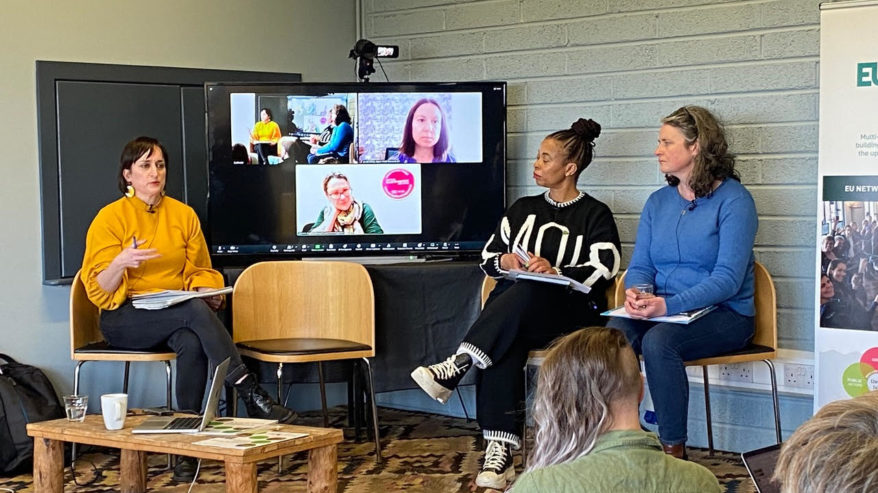
The next panel of Joanne Butler (Donegal LDC), Jo da Silva (OFN UK), Cynthia Masina (MASI) and Evonne Boland (OFN Ireland) assembled to discuss the question of food equality and access to local food.
The Donegal Food Response Network which included 17 food banks across the county, took steps to improve the quality of the food being distributed by engaging with the Food Cloud Growers project. This pilot project which finished recently resulted in reduced packaging waste, while supplying about 60 tonnes of vegetables to food banks in the county. Importantly, local growers were the suppliers into this.
The logistical challenges were valuable learning opportunities and the goal of the network now is to develop a community farm and growing projects to supply the food banks locally.
Jo from OFN UK gave a picture of a community response which is also trying to move away from the food surplus model. The recent Resilient Green Spaces project which was supported by the Welsh government involved six different aspects of good food development: allotments; food hubs; community orchards; greener corridors; community access to farms and land; and horticulture skills.
Five new Community Hubs were established, which helps develop new routes to market for local producers and a number of community growing spaces.
The reality in the Irish direct provision system came under scrutiny as Cynthia explained the model of food provision which can range from self-catering with limitations to a fully catered service. There is a wide range of quality within the system and issues such as limited meal times, lack of consideration of dietary needs, restricted access to cooking facilities and poor quality food from the in-centre ‘shops’ are reported regularly.
Community Food Hubs can provide more holistic responses to the challenges of food inequality as well as acting as places of integration and cohesion for places which are welcoming new community members and facing the challenges of the growth of far right messaging and activities.
Maps and Digital Tools
After lunch two concurrent afternoon workshops looked at the topics of ‘Digital solutions for sustainable food systems’, with CODECS and ‘Mapping Ireland’s local food ecosystem’ with the EU4Advice team.
The digitalisation workshop involved a presentation of the OFN platform and the Hubs model, followed by a robust analysis and discussion of the blockers and enablers to digital solutions in the sector.
The barriers ranged from a lack of skills and apprehension around digitalisation to the design of the funding and other supports available to practitioners.
Enablers identified included good, appropriate tools, such as OFN, and relevant training, in person especially for those not already embracing the digital world. The OFN team issued a call out for more collaborators to ensure that the project remains operational in Ireland and indeed grows to meet its full potential.
Hosted by the EU4Advice project, the second workshop was aimed at exploring and mapping Ireland’s local food ecosystem. This was a valuable opportunity for participants to collaborate, share insights, and contribute to the understanding of which actors and collaborations fuel local food systems in Ireland.
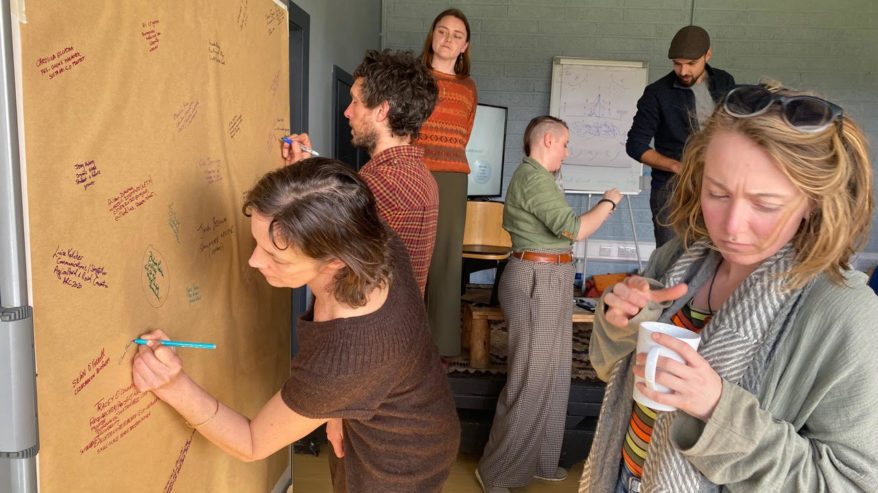
Discussions here included considering the efficiencies of collaboration when engaging with policy makers, the need to mainstream local food chains – with the same passion as we have for local GAA clubs! – and the recognition of farmers as champions of biodiversity once reliable information is available.
Both the Talamh Beo Local Food Policy Framework and the Feeding Ourselves Community of Practice offer opportunities on which the Living Lab at Cultivate can build.
Emerging Voices
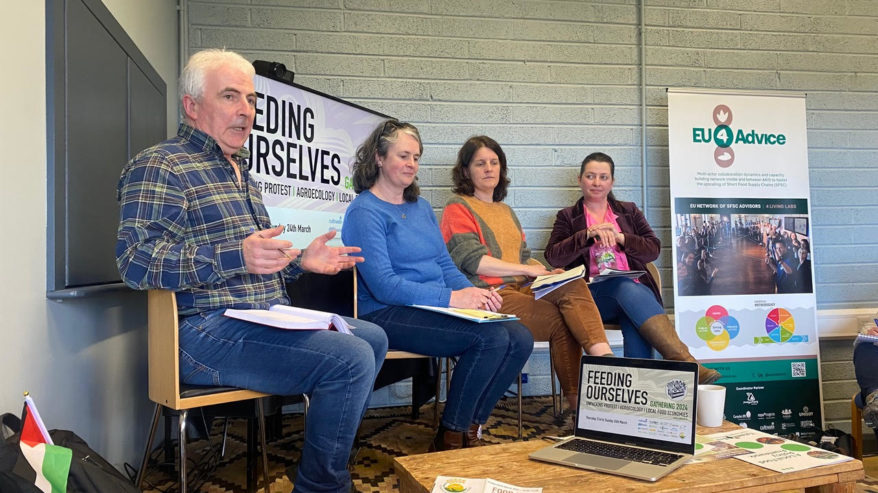
The final panel of the day brought together some ‘Emerging Voices from the Field’ as we heard from Beth Bell (Food Ethics Council) and Lee Robb (Carrick Greengrocers), both in Northern Ireland, John Brennan (Drumshanbo Food Hub) and Maarten Klop (Operation Food Freedom Utrecht).
People present heard about the importance of food citizenship and the issue with referring to people as consumers when it comes to food. The examples of The Larder in Belfast and Grenfell Community Kitchen in London both illustrate the value of a more holistic response to the challenges of food inequality, by taking a more proactive role in local sourcing of food and the means of production themselves.
The lesson from The Netherlands was that what people need is food freedom and this can only be achieved by working closely with farmers.
The story of Carrick Greengrocer in Carrickfergus is another case in point where a Community Share Offering in Summer 2023 raised over £34k and allowed the townspeople to open their own greengrocer in the town, something which had been missing from the High St. for 15 years. The initiative is going from strength to strength and is a prime example of the community doing it for themselves. “There’s nobody coming to save us”, as Lee said, and the overwhelming message from this session was that change comes from grassroots actions, building new models rather than fighting with or trying to change the existing ones.
Key Takeaways
RESOURCES & EXPERTISE exist in the grassroots and community. We can learn from examples in Ireland and elsewhere.
- Lesson from Netherlands, and the examples of Local2Local Grounded and Amped. Gather the people, knowledge and resources within the community – build networks, connect people, match expertise and resources with need; gather ideas, bring together to make it happen, then look for Attention and Funding.
- EU4Advice can help build this in Ireland, with Cultivate as a living lab partner.
- Peer-to-peer learning is key. A lot happening but needs more support.
COMMUNITY APPROACHES – are key, but often ‘community’ often means low/no pay, so how do we ensure this work is valued? Volunteerism is important, but has its limits (e.g. burnout).
FOOD ACCESS – this community is inclusive, good quality local food needs to be accessible at all. Pathways for this include:
- Public Procurement: Public money for public good, win-win of providing wholesome food to hospitals, schools, etc and provide security of route to market and fair price to primary producers.
- Solidarity and Community responses – that challenge current system, not validate and embed it. E.g. social supermarkets (examples from OFN UK) and co-ops (eg. Carrick Greengrocers)
- Social credits to purchase local food (as proposed in TB Local Food Policy Framework and as in operation on a trial basis in France and Belgium already)
OWNERSHIP is key. We need Governance spaces, infrastructure, food hubs, digital platforms community-owned and operated. Access to Land is emerging as especially important, including now in Ireland.
TRUST – Mistrust is growing, people’s mistrust of industry, but also mistrust amongst farmers – not all farmers think and believe the same things. Mistrust has grown in part because the cost of living crisis, was not a crisis for big industry, which also increased profits during Covid. Solutions then, do not lie with those who have been steering things up to now. Local, co-operative and community-based approaches can provide an alternative citizens can trust.
CHOICE – actually doesn’t exist in many places, Supermarkets are only option to buy food – so we can provide alternative.
LIVELIHOODS – none of it will be possible without fair incomes for primary producers and access to land.
LANGUAGE – as part of all of this, and as has been championed by Slow Food and many others, shift language from Consumer to other concepts such as co-producer, food citizen or similar, is key **
**important to note that Citizenship is used here as a concept that infers rights and responsibilities, but is not related to nationality. It’s all eaters who deserve political rights, even if they are denied them presently.
*The collaborative project, supported by the Department of Environment Climate and Communications under the Community Climate Action Fund (Strand 2) is lead by Sonairte, along with Open Food Network and Cloughjordan Community Farm. The Community Food Hub toolkit of resources and case studies was launched at the end of the day’s activities.
More
Feeding Ourselves 2023 – Diversified Diversification in Action
Feeding Ourselves 2022 – Crises Compound, Food Sovereignty Movement Mobilises

